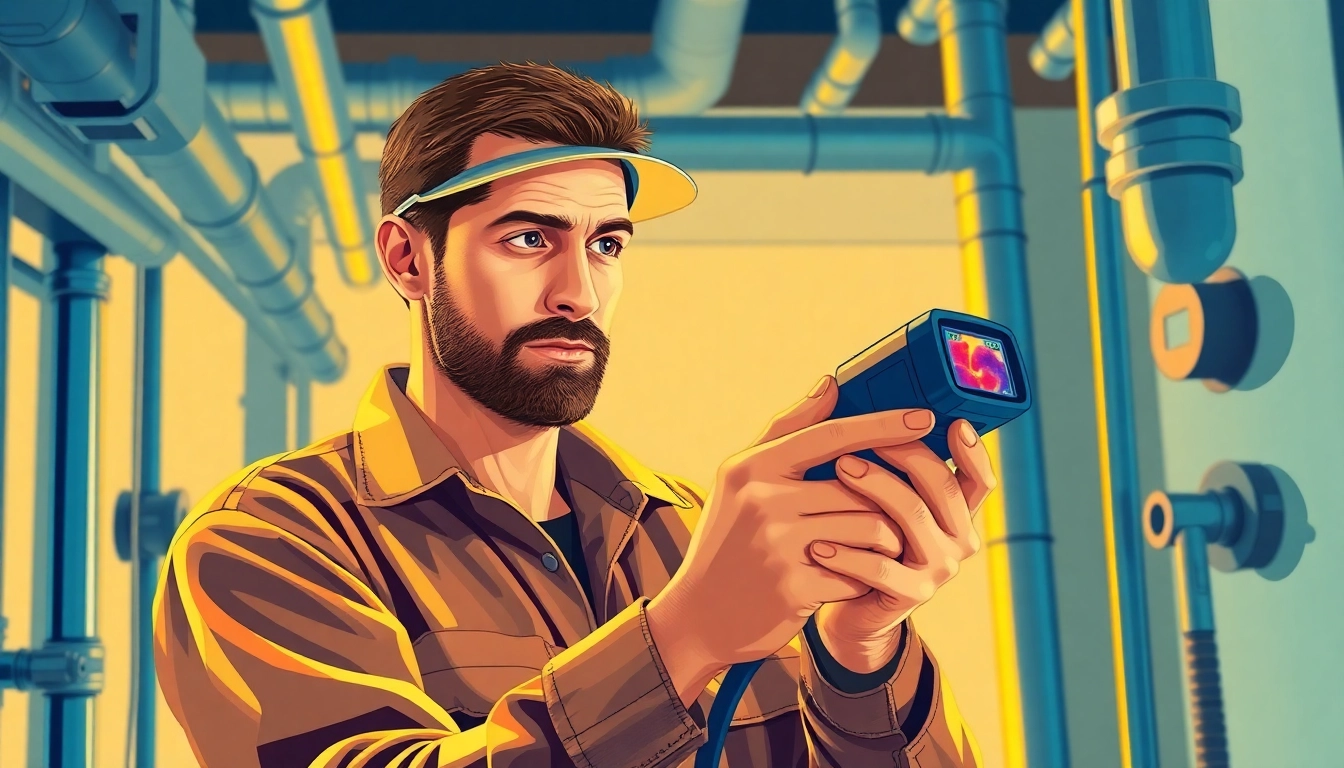Expert Water Leak Detection Specialist: The Ultimate Guide for Homeowners

Understanding Water Leak Detection Specialist Services
What Does a Water Leak Detection Specialist Do?
A Water leak Detection Specialist is a professional trained to locate and diagnose leaks in various plumbing systems. Their expertise extends to residential, commercial, and industrial settings, where they utilize a variety of advanced techniques and tools. These specialists identify leaks that might not be immediately visible, helping to prevent extensive damage and costly repairs.
The role of a water leak detection specialist goes beyond a simple inspection. They must assess the situation thoroughly, taking into account factors such as water pressure, pipe materials, and plumbing layouts. This requires a combination of technical knowledge and hands-on skills, as well as an understanding of the latest technologies in leak detection.
The Importance of Professional Leak Detection
Professional leak detection is crucial for several reasons. Firstly, leaks can cause significant damage to a property, leading to structural problems, mold growth, and increased utility bills. Detecting these leaks early can save homeowners and businesses thousands of dollars in repair costs. Secondly, trained specialists are equipped to find leaks that are hidden behind walls or underground, which non-professionals might overlook.
Moreover, investing in professional services ensures that the leak is addressed correctly, reducing the likelihood of recurring issues. Many homeowners attempt DIY methods to locate leaks, which can not only fail to resolve the issue but also exacerbate the problem, leading to further expenditures.
Common Techniques Used by Specialists
Water leak detection specialists employ various techniques to locate leaks accurately. Some of the most common methods include:
- Acoustic Listening Devices: These are used to amplify the sound of leaks that are often inaudible to the human ear. The specialist listens for the hissing sound of escaping water, which indicates a leak’s location.
- Infrared Thermography: This technique uses thermal cameras to identify temperature discrepancies in walls and floors. A sudden change in temperature can indicate the presence of water, helping specialists pinpoint the leak.
- Moisture Meters: These tools measure the moisture content in materials, allowing specialists to identify areas where water has accumulated, even if it’s not visible on the surface.
- Pressure Testing: This method involves pressurizing the plumbing system to check for drops in pressure, indicating potential leaky points.
These techniques, along with the specialist’s training and experience, contribute to a successful leak detection process, minimizing disruption to the property.
Identifying Signs of Water Leaks in Your Home
Key Indicators of Hidden Leaks
Homeowners should be alert to several signs that might indicate the presence of a hidden leak. These include:
- Unexplained increases in water bills.
- The presence of mold or mildew in areas prone to moisture.
- Water spots on ceilings, walls, or floors.
- A persistent musty odor.
- Warped or stained flooring and drywall.
Recognizing these indicators early can lead to prompt action, reducing the potential for extensive water damage.
How to Inspect Your Home for Leaks
Conducting a basic inspection for leaks can be a proactive approach to protect your home:
- Check your water meter before and after a two-hour period of non-water use. If the meter doesn’t remain unchanged, a leak is present.
- Inspect visible pipes for signs of moisture or corrosion.
- Look under sinks and around toilets for pooling water.
- Examine your water heater for leaks or corrosion signs.
- Consider using dye tablets in toilets to check for silent leaks.
By staying vigilant and regularly inspecting your home, you can potentially save yourself from severe water-related incidents.
Tools Homeowners Can Use
Homeowners can utilize several tools to help identify leaks before they escalate:
- Moisture Meter: This device helps measure the moisture level in your home’s materials.
- Water Leak Sensor: Placed in areas likely to experience leaks (like under sinks), these sensors send alerts to your smartphone when they detect moisture.
- Infrared Thermometer: This handheld device can spot temperature variations on surfaces, hinting at potential leaks behind walls.
While these tools can assist in early detection, professional evaluation is recommended for verifiable results.
Benefits of Hiring a Water Leak Detection Specialist
Cost Savings and Preventative Measures
Hiring a water leak detection specialist offers substantial cost savings in the long run. Early leak detection can prevent small issues from escalating into significant and costly repairs. Water damage can severely impact the structural integrity of your home and lead to mold growth, which is not only expensive to remediate but also poses health risks.
In addition, a specialist can help identify underlying problems that may contribute to leaks, providing preventative measures to mitigate future risks. This expertise ultimately protects your investment and enhances the longevity of your home’s plumbing infrastructure.
Expertise and Advanced Techniques
Water leak detection specialists possess extensive training and experience, allowing them to tackle even the most challenging leak scenarios. Their knowledge of plumbing systems and the latest detection technologies ensures accurate and efficient leak location.
Moreover, specialists understand how various environmental factors can affect plumbing systems, allowing them to identify non-obvious leaks, such as those caused by fluctuations in temperature or pressure.
Peace of Mind for Homeowners
Hiring a water leak detection specialist provides homeowners with peace of mind, knowing that potential issues are being addressed professionally. This trust in expert hands alleviates the stress associated with water damage concerns.
Additionally, a thorough leak detection process often comes with a detailed report, outlining findings and recommendations for addressing any leaks detected. This transparency is invaluable for homeowners looking to maintain a safe and sound living environment.
What to Expect from a Professional Leak Detection Service
Steps Involved in the Detection Process
When working with a water leak detection specialist, expect a structured process that includes:
- Initial Assessment: The specialist will evaluate the property and gather information about the plumbing system and any visible signs of leaks.
- Testing and Inspection: Utilizing advanced detection technologies, the specialist will conduct a series of tests to identify the exact location of the leak.
- Report and Recommendations: Once the leaks are detected, a comprehensive report is generated, including findings and actionable recommendations for repairs.
Following this structured approach ensures a thorough inspection and ultimately leads to lasting solutions.
Common Technologies and Tools Used
Specialists employ various state-of-the-art technologies to ensure effective leak detection:
- Acoustic Leak Detection: Amplifies the sound of leaks for pinpoint accuracy.
- Thermal Imaging Cameras: Detects temperature changes associated with water leaks.
- Pressurization Equipment: Tests the plumbing system under controlled conditions to spot weaknesses.
These technologies, combined with the specialist’s expertise, significantly enhance leak detection accuracy and efficiency.
Post-Detection Services Offered
After leak detection, many specialists offer additional services:
- Repair Services: Some specialists have the skills to carry out necessary repairs immediately after identifying a leak.
- Preventative Maintenance: Recommendations for ongoing maintenance can help avoid future leaks.
- Mold Inspection: They can inspect for any mold growth due to undetected leaks and recommend remediation services.
Choosing a service that provides comprehensive post-detection care can help maintain your home’s health and safety.
Choosing the Right Water Leak Detection Specialist
What to Look for in a Specialist
Selecting the right water leak detection specialist is critical to ensure effective and reliable service. Look for the following attributes:
- Qualifications and Certifications: Ensure the specialist is trained and certified in leak detection practices.
- Experience: A track record of successful leak detection can indicate the specialist’s skill level.
- Technological Capabilities: The use of advanced technologies indicates a commitment to accuracy and efficiency.
Questions to Ask Before Hiring
Before hiring a leak detection specialist, consider asking these essential questions:
- What detection methods do you use?
- Can you provide references from previous clients?
- Do you offer a guarantee for your services?
- What are the estimated costs involved?
These inquiries will help you gauge the specialist’s competence and reliability.
Evaluating Reviews and Recommendations
Online reviews and testimonials can provide valuable insights into a specialist’s reputation. Look for feedback regarding their punctuality, professionalism, and effectiveness. You can also ask friends or family for recommendations based on their past experiences.
By conducting thorough research and carefully selecting a water leak detection specialist, you can enhance the protection of your property and ensure effective leak management.





